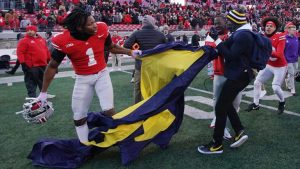
At the recent SEC Spring Meetings, Georgia Bulldogs head coach Kirby Smart took center stage to discuss the intricate art of managing a college football roster in today’s ever-evolving landscape. With the SEC’s reputation as one of the most competitive and talent-rich conferences in the country, the challenges of assembling and maintaining a championship-caliber roster are greater than ever before. Smart, widely regarded as one of the brightest minds in college football, offered a revealing glimpse into how the Bulldogs approach roster management — balancing recruiting, player development, scholarship allocations, transfers, and the increasingly complex Name, Image, and Likeness (NIL) era.
From the moment Kirby Smart took over as head coach in 2016, he has made roster management a foundational pillar of Georgia’s rise to national prominence. His candid discussion at the meetings underscored how the roster is much more than just a list of players on a depth chart — it’s a dynamic, strategic puzzle that requires foresight, adaptability, and an unwavering commitment to excellence.
Smart began by emphasizing the importance of recruiting the right players — not only in terms of raw talent but also character, work ethic, and fit within Georgia’s system and culture. “It’s about more than just finding five-star athletes,” Smart said. “We’re building men, not just football players. That means recruiting players who buy into our culture, understand the commitment required, and have the mindset to grow, improve, and contribute on and off the field.”
He explained how Georgia’s coaching staff has invested heavily in creating a detailed player evaluation and development process. This begins long before a prospect signs a letter of intent. Coaches spend countless hours analyzing game tape, attending high school games, meeting with family and coaches, and even evaluating players’ academic standing and personal values. Smart explained that recruiting is a year-round, almost nonstop endeavor because it shapes the foundation of the program’s future.
Once players arrive on campus, the real roster management begins. Smart spoke extensively about how managing scholarships requires a delicate balance. The NCAA currently limits FBS programs to 85 scholarships, which means coaches have to carefully monitor how those are distributed each season. Injuries, early departures to the NFL, transfers, and academic issues can rapidly alter the makeup of the roster. “You can’t just fill up your scholarships blindly,” Smart explained. “You have to have a plan for each position group, consider how many players you’re developing internally, and anticipate potential departures. It’s a constantly shifting puzzle.”
A key part of this puzzle is the transfer portal, which has fundamentally changed college football roster management. With players now able to transfer once without penalty, coaches must not only focus on recruiting incoming high school talent but also be agile and savvy in evaluating transfer prospects. Smart shared that the Bulldogs actively scout the portal for players who can fill immediate needs or add depth to critical positions. “The transfer portal has added a new layer to recruiting and roster building,” Smart noted. “You have to be flexible and proactive — sometimes you need to bring in a seasoned player to provide leadership and experience, especially in key spots.”
Smart also highlighted the growing importance of player retention. With NIL opportunities exploding, keeping top talent in the program means creating an environment that supports both athletic and personal growth. Georgia has invested in resources to help players maximize NIL deals, manage their brand, and navigate the complexities of balancing football and personal business ventures. “We want our players to succeed on and off the field,” Smart said. “If we can create an environment where they feel supported, valued, and empowered, they are less likely to look elsewhere.”
An intriguing part of Smart’s discussion revolved around player development. He stressed that one of Georgia’s competitive advantages is their ability to take highly talented recruits and develop them into NFL-ready players through expert coaching, nutrition, sports science, and mental conditioning. This holistic approach ensures that players continue to improve throughout their careers at Georgia, making roster depth more sustainable. “Recruiting gets you in the door, but development is what keeps you winning year after year,” he explained.
Smart also touched on the challenges posed by early NFL departures, which have accelerated in recent years. Losing impact players after just one or two seasons creates holes that must be filled quickly. Georgia’s staff carefully tracks the draft potential of their top prospects and adjusts recruiting and development plans accordingly to prepare for any gaps. “It’s a balancing act,” Smart said. “We want to give our players the best chance to succeed at the next level, but we also have to prepare our roster for when those players leave.”
Throughout his talk, Smart conveyed a clear message: success in the SEC — where every team is loaded with elite talent — requires meticulous roster management. It’s not enough to simply recruit five-star players; programs must be strategic about scholarship distribution, proactive with the transfer portal, focused on player retention, and relentless in player development. Smart’s approach has helped Georgia build one of the nation’s deepest, most talented rosters, culminating in multiple SEC championships and a national title.
One particularly fascinating insight Smart shared was how technology has become a crucial tool in roster management. Georgia employs advanced analytics to track player performance, monitor injury risks, and optimize practice loads. Coaches use data-driven insights to make smarter decisions about which players to develop for future roles and which might be better suited for immediate contributions. This scientific approach complements traditional scouting and coaching, making the Bulldogs’ roster planning more precise and effective.
The importance of culture in roster management was another theme Smart stressed. He explained that maintaining a cohesive team culture reduces transfer rates and helps players buy into long-term development plans. Georgia’s leadership focuses on building relationships, fostering accountability, and instilling pride in representing the Bulldogs. “When players feel part of something bigger than themselves, they’re more committed to the team and the process,” Smart said. “That loyalty is priceless.”
The SEC Spring Meetings gave Smart a platform to lay bare the complexities of roster management in modern college football. For fans, it offered a rare behind-the-scenes look at the painstaking work that goes into building a championship roster. For fellow coaches and administrators, it provided insights into best practices and emerging trends shaping the future of the sport.
As the landscape of college football continues to evolve with NIL, transfers, and expanded recruiting territories, Kirby Smart’s roster management philosophy offers a blueprint for success. It’s about blending traditional values of hard work and character with innovative strategies and cutting-edge technology. It’s about building a team that can win now while sustaining excellence for years to come. And most importantly, it’s about developing young men who are prepared to excel both on the gridiron and in life.
Georgia fans can rest assured that under Kirby Smart’s leadership, the Bulldogs’ roster is in capable hands — carefully managed, strategically constructed, and relentlessly developed to compete at the highest level in one of the toughest conferences in college football. As spring turns to summer and recruiting heats up once again, the foundation Smart outlined at the SEC meetings will continue to be the driving force behind Georgia’s pursuit of continued dominance on the national stage.





